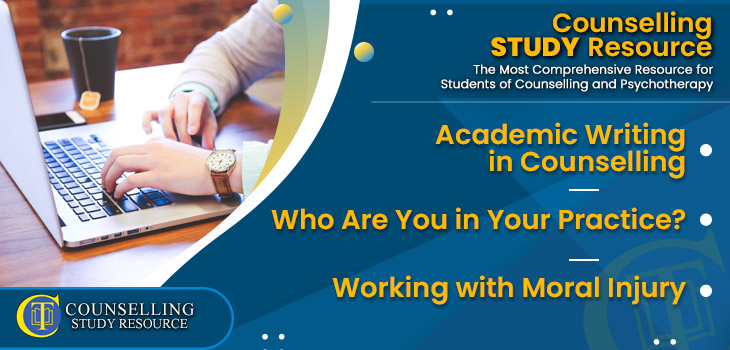197 - Academic Writing in Counselling
Who Are You in Your Practice? – Working with Moral Injury
In Episode 197 of the Counselling Tutor Podcast – the first of the new season, as we enter the start of the 2021/22 academic year – presenters Rory Lees-Oakes and Ken Kelly introduce two new regular slots:
- ‘Counselling Foundations’ – this section will explore theory, skills and practice points that underpin counselling practice, and is intended to be useful to both students and qualified practitioners. The focus in this episode is on academic writing in counselling.
- ‘Focus on Self’ – this recognises the importance of self in counselling training and work, and today looks at who you are in your counselling practice.
Last but not least, in our ongoing ‘Practice Matters’ slot, Rory interviews Amy Launder on working with moral injury.
Academic Writing in Counselling (starts at 2.15 mins)
Academic writing is part of counselling life. While students of counselling and psychotherapy clearly are expected to produce various assignments and other pieces of written work as part of their evidence of learning, qualified practitioners too may continue to face the need to produce academic writing for any further studies and CPD, and if they are undertaking research projects.
Rory and Ken talk about the various barriers that may face those approaching academic writing and explore the feelings that they might face as they prepare to write. Counselling Tutor has produced a course on academic writing specifically to support people in this situation.
Ken describes the aspects of academic writing in counselling covered by the new course and shares a number of tips for approaching academic writing, relating to:
- the importance of understanding the question, and how to ensure you have done this before starting work
- Bloom’s verbs
- time management and planning in academic writing
- location for academic writing
- how to find the information and quotations you need to evidence your work
- referencing tools
You can find out more about the new course on the Counselling Tutor website.
Who Are You in Your Practice? (starts at 16.25 mins)
In the first in this new ‘Counselling Foundations’ slot, Ken asks Rory: ‘Who are you in your practice?’ Rory’s response – that he is himself, but a professional, edited version compared to the one that might drink tea with a friend – leads to a wide-ranging discussion on many aspects of how self affects counselling work, including:
- self-disclosure
- self-care
- imposter syndrome
- bracketing
- parallel process
- transference
- parallel process
- mirroring
- self-awareness
- personal development
Rory has prepared a free handout on the use of self in counselling, which is available here.
Working with Moral Injury (starts at 35.25 mins)
Rory speaks with psychotherapist Amy Launder, who has recorded a lecture for Counsellor CPD (our online CPD library containing hundreds of hours of on-demand CPD lectures, training and resources to support your professional development) on working with moral injury. This is a topic that has huge relevance to many clients and is particularly topical in the times of the COVID-19 pandemic and its aftermath.
Rory and Amy discuss:
- what moral injury is
- the origins of moral injury in military service
- what might cause moral injury
- how moral injury and post-traumatic stress disorder (PTSD) relate to each other
- the impacts of moral injury
- how a client with a moral injury may present in the counselling room
- the trolley dilemma (a classic thought experiment developed by philosopher Philippa Foot in 1967 and adapted by Judith Jarvis Thomson in 1985)
- how we can work effectively with moral injury
- pros and cons of different modalities in this area of work


